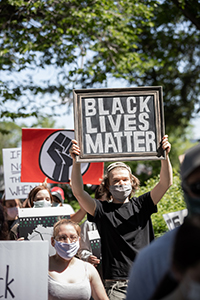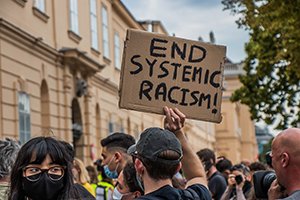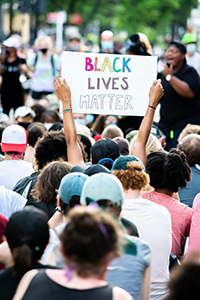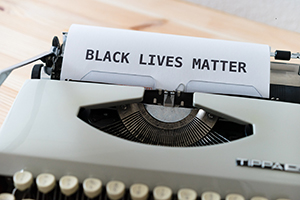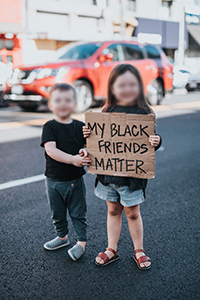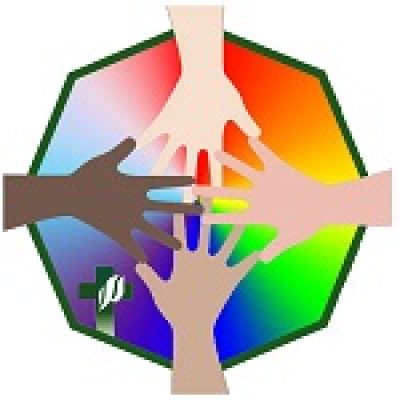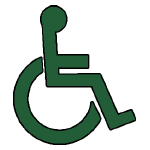September - May: Sunday Discipleship Hour | 9:00 am
Open Office Hours: Monday through Thursday | 9:00 am - 3:00 pm
Racial Justice Group
Racial Justice Group
The Racial Justice Group is now called the JEDI (Justice, Equity, Diversity, and Inclusion) Group! The work of the LGBTQ+ Inclusion Group has been folded into the JEDI Group and the name change reflects the group’s broader mission to love and serve all people.
Staff Liaison: Pastor Lara Forbes
Meetings: Fourth Wednesday, 7:00 pm
At the August 2020 Congregation Council meeting, the Council approved formation of a Racial Justice Group and authorized it to research and make recommendations to the Council on how Saint Andrew’s can address racial justice issues and specifically Black lives and the Black Lives Matter movement.
Group Video
On this webpage….
Current Opportunities Racial Justice Statement Purpose Statement Did You Know.... Resources
Current Opportunities
July 2022: On Saturday, June 25, 2022, a Black male carpenter found a noose hung in a shared storage trailer on a construction site in Redmond, WA. A tool was taped to the noose with the carpenter’s name written on it. The Racial Justice Group has issued a statement condemning this act. The statement has been endorsed by the Congregation Council.
Read the StatementForums:
February 28, 2021: We shared why this work is important, why the group was created, and what our goals are
May 16, 2021: We discussed “Who is Our Neighbor?” and specific actions we can take (updated March 2022)
November 7, 2021: We explored Native American Justice and looked at the history of the Fish Wars
February 13, 2022: We learned about Japanese-American WWII Incarceration
June 12, 2022: We learned about Juneteenth and our place with this National Holiday
October 16, 2022: We delved into the subject of and lead meaningful discussion around the historical context of noose incidents across the U.S. and in our local communities, and the anti-racist work we are called to do in order to heal from and prevent further racially-motivated harassment and threats. A list of resources used for the presentation is on the page with the recording.
Racial Justice Statement (Approved by Congregation Council – April 2021)
Statement:
At Saint Andrew’s we take our mission statement seriously – “to Love and Serve All People”. Saint Andrew’s stands in support of the Black community and Black lives. We strive to support all our neighbors, including our Black, Brown, Indigenous, Asian, and other neighbors of color.
Recognizing the systemic racism and racial inequality in our community and nation, we acknowledge that we cannot remain silent, nor can we sit idly by. Remaining silent only contributes to injustice.
Action:
We commit to the ongoing work to find ways to better Love and Serve ALL People. As a start, Saint Andrew’s has created a Racial Justice group to guide our congregation in ways to address the injustice facing our neighbors in the BIPOC (Black, Brown, Indigenous and other People of Color) community.
Initial Goals for the Racial Justice group:
- Look for ways we may be enabling racism so we can change and grow together as a community in Christ.
- Provide education and resources to the congregation on racism in our community and ideas of how to counter that injustice.
- Provide ideas of how our church can be more welcoming to members of the BIPOC community.
- Make recommendations to the congregation on actions we can take to better support the Black community and the BIPOC community at large.
Purpose Statement (November 2020)
George Floyd’s killing in May 2020 and the demonstrations that followed were a tipping point that make it clear that there are class divisions in our society that clearly benefit white people and relegate Black, Indigenous and People of Color (BIPOC) to second class status. Our continued silence in the face of clear evidence of that division puts into question if we are living up to our mission statement “Growing together in Christ to love and serve all people.” The Racial Justice Group was created to investigate the ways we are falling short of and facilitate action toward racial equity as we strive to make our mission and values principles we truly live by. We believe doing this important work will have far-reaching benefits by helping us better understand and navigate our differences.
Goals:
- Form a standing Racial Justice Committee
- Recommend specific actions for the congregation to take
- Provide educational opportunities to increase our understanding of our increasingly diverse neighbors
- Work with existing committees and staff to incorporate racial equity work into all aspects of ministry
Guiding Questions:
- Who are we welcoming and inviting in to our congregational life?
- How might we be unintentionally excluding people or groups?
- What unconscious messages do we send about who belongs and who doesn’t?
- Who is doing the welcoming and inviting? How can we create or reinforce the attitude that this is everyone’s responsibility?
- Do we assume visitors are familiar with our worship style? How can we make it more navigable for those who are not?
- Do we understand the Black Lives Matter movement and how it ties into our mission and values?
- What assumptions do we currently hold about Black Lives Matter? Can they be verified or disproven?
- Are we more curious or defensive about the concept of white privilege? How can we move toward curiosity rather than defensiveness when addressing the inequities caused by white privilege?
- Does our congregation reflect the world around us?
- Are we willing to change to serve our neighbors? Are we willing to embrace the discomfort and vulnerability that come with change and growth?
- Can we live in to our mission and values without change?
- What does it mean for us to serve our neighbors in Bellevue, Washington?
Did You Know…..
About the Selma Marches?
Did you know the Selma March was actually multiple marches over several days in the month of March?
Read more below…:
From Encyclopedia Britannica:
“On March 7, 1965, Martin Luther King, Jr., organized a march from Selma, Alabama, to the state’s capital, Montgomery, to call for a federal voting rights law that would provide legal support for disenfranchised African Americans in the South. State troopers, however, sent marchers back with violence and tear gas, and television cameras recorded the incident.
“On March 9 King tried again, leading more than 2,000 marchers to the Pettus Bridge, where they encountered a barricade of state troopers. King led his followers to kneel in prayer and then he unexpectedly turned back.
“The media attention prompted President Johnson to introduce voting rights legislation on March 15, and on March 21 King once again led a group of marchers out of Selma; this time, they were protected by Alabama National Guardsmen, federal marshals, and FBI agents. Marchers arrived in Montgomery on March 25, where King addressed the crowd with what would be called his ‘How Long, Not Long’ speech. The Voting Rights Act was signed into law several months later, on August 6. It suspended literacy tests, provided for federal approval of proposed changes to voting laws or procedures, and directed the attorney general of the United States to challenge the use of poll taxes for state and local elections.”
An excerpt from Dr. Martin Luther King Jr.’s “How Long, Not Long”:
“Today I want to tell the city of Selma, today I want to say to the state of Alabama, today I want to say to the people of America and the nations of the world, that we are not about to turn around.
We are on the move now.
“Yes, we are on the move and no wave of racism can stop us. We are on the move now. The burning of our churches will not deter us. The bombing of our homes will not dissuade us. We are on the move now. The beating and killing of our clergymen and young people will not divert us. We are on the move now. The wanton release of their known murderers would not discourage us. We are on the move now. Like an idea whose time has come, not even the marching of mighty armies can halt us. We are moving to the land of freedom.”
About Property Deed Language?
Did you know that many Seattle area homes have discriminatory language in their deeds? Throughout the early to mid-1900’s it was common for property deeds in the Seattle area to have language similar to the following:
“No person excepting of the Caucasian race shall ever be permitted to own or occupy said premises or reside thereon, excepting the capacity of a domestic servant.”
Starting this year, King County made it easier for you to have this language removed from your deed altogether by going through the King County Superior Court for a replacement deed that can then be filed with the Recorder’s Office. But how do you know if your deed contains discriminatory language? The University of Washington has a database where they are collecting information on the deeds from the area or you can request your deed from the Recorder’s office.
For more information read this Seattle Times Article published December 15, 2021
The UW database can be searched here: https://depts.washington.edu/civilr/covenants.htm.
About Land Acknowledgments: What they are and how to create your own?
A land acknowledgment is a formal statement that a public event is taking place on land originally inhabited by indigenous peoples. When there is such a history of strife and conflict, it is incredibly powerful for non-Indigenous communities to show respect and honor the Indigenous Peoples of the land on which they continue to work and live. Social groups, clubs, organizations, workforces, universities, and more groups have all made strides to learn about land acknowledgements. Here at Saint Andrew’s we have used the below statement:
We, at Saint Andrew’s Lutheran Church, acknowledge that in this space we are on the traditional lands of the Duwamish and Coast Salish people. A people that are still here, continuing to honor and bring to light their ancestral heritage.
Here are steps you can take to create your own land acknowledgment:
- Start with self-reflection
- Do your homework
- Use appropriate language
- Use past, present, and future tenses
- Don’t ask an Indigenous person to deliver a “Welcome” statement for your organization
- Build real, authentic relationships with Indigenous people.
About Juneteenth?
Juneteenth has been celebrated annually on June 19th by African Americans since 1865 to commemorate the end of enslaved people in the United States of America. In fact, it is often referred to as the second Independence Day of the United States of America. Now it is a federal holiday on June 19th.
But did you know that it took 2 ½ years before those who were enslaved to hear of the freedom granted by the Emancipation Proclamation of President Abraham Lincoln on January 1, 1863? General Granger arrived in Galveston, Texas on June 19th, 1865 with the Order that:
“The people of Texas are informed that in accordance with a Proclamation from the Executive of the United States, all slaves are free. This involves an absolute equality of rights and rights of property between former masters and slaves, and the connection heretofore existing between them becomes that between employer and hired laborer.”
It’s a time for celebration, potluck, guest speakers, reflection, and much more! But is it…
On Sunday, June 12, 2022, at the Discipleship Hour Forum, the Saint Andrew’s Racial Justice Group will further explore Juneteenth and our place with this National Holiday.
About “Privilege”?
For many people the idea of privilege is difficult to recognize as applying to themselves. “Privilege” refers to certain social advantages, benefits, or degrees of prestige and respect that an individual has by virtue of belonging to certain social identity groups. Within American and other Western societies, these privileged social identities—of people who have historically occupied positions of dominance over others—include whites, males, heterosexuals, Christians, and the wealthy, among others. Many of us don’t feel that we are privileged. We are not rich. Life isn’t always easy. We face challenges and hard times. We have to work hard.
A Facebook post from St. Alban’s Episcopal Church gives Privilege a somewhat different perspective.
“Privilege isn’t the presence of perks and benefits. It’s the absence of obstacles and barriers. That’s a lot harder to notice. If you have a hard time recognizing your privileges, focus on what you don’t have to go through. Let that fuel your empathy and action.”
We live in a society with established systems that present obstacles and barriers to people of color that those who are white don’t experience.
Here is a link to a great video entitled “Deconstructing White Privilege” by Dr. Robin DiAngelo. It is 22 minutes long and well worth taking the time to view: https://www.youtube.com/watch?v=h7mzj0cVL0Q.
That you have hidden biases?
We all have biases of different kinds. Many of those biases are obvious and we share them with other people. You may like chocolate or sugar. Or you may dislike chatty people or loud people. But did you know that you also have hidden biases? A group of researchers including Tony Greenwald of the University of Washington developed a series of simple tests you can take which illuminate those biases we have learned from family, friends, peers, teachers, neighbors and even governments.
Go online at the link below and it is recommended you select the racial bias test first. It’s pretty simple but will give you insight over how we automatically react to those around us.
After you take the test, review “strategies to reduce bias” and the reasons why we should strive to be more “bias free”.
https://resources.lmu.edu/dei/initiativesprograms/implicitbiasinitiative/whatisimplicitbias/testyourimplicitbias-implicitassociationtestiat/
About Land Acknowledgments: What they are and what they mean?
For those of you who attended the November 7 Adult Discipleship Hour Forum put on by the Racial Justice Group, you may remember that we started the meeting with a Land Acknowledgment. The Land Acknowledgment that was read was:
We, at Saint Andrew’s Lutheran Church, acknowledge that in this space that we are on the traditional lands of the Duwamish and Coast Salish people. A people that are still here, continuing to honor and bring to light their ancestral heritage.
According to Delilah Friedler of Teen Vogue [1]:
The purpose of these statements is to show respect for indigenous peoples and recognize their enduring relationship to the land. Practicing acknowledgment can also raise awareness about histories that are often suppressed or forgotten.
“There have always been indigenous peoples in the spaces we call home, and there always will be,” Kanyon Sayers-Roods, a Mutsun Ohlone activist in Northern California, tells Teen Vogue. The Ohlone are indigenous to the Bay Area, and Kanyon is often invited to make acknowledgment statements at events in San Francisco and Oakland.
“The acknowledgment process is about asking, What does it mean to live in a post-colonial world? What did it take for us to get here? And how can we be accountable to our part in history?” she says.
If you want to find out more about land acknowledgments, the local Duwamish Tribe has excellent information on their website – https://www.duwamishtribe.org/. To find out what Indigenous People lived on the land where you are, explore this map by Native Land: https://native-land.ca/
[1] https://www.teenvogue.com/story/indigenous-land-acknowledgement-explained referenced December 7, 2021
The ELCA recently released a Declaration to American Indian and Alaska Native People confessing we have benefited from, participated in and been complicit in practices that have harmed Indigenous people?
It then pledges to honor, learn from, and support Native leadership in working toward justice and equity for Indigenous people. You can read the full Declaration here: https://download.elca.org/ELCA%20Resource%20Repository/Declaration_to_American_Indian_Alaska_Native.pdf
The Duwamish People are still not recognized by the Federal Government?
The Duwamish are the First People of present-day Seattle, a name of the Tribe’s most well-known leader, Chief Si’ahl (Seattle). Did you know that the Duwamish people are still not recognized by the Federal Government despite this history? If you’d like to support this tribe in their pursuit for recognition, you can sign the petition: https://www.change.org/p/federal-recognition-for-the-duwamish-tribe. To find out more information about the Duwamish people, visit https://www.duwamishtribe.org/
You can watch short videos (3 to 10 minutes) that are entertaining, enlightening, and thought-provoking about Racism called “Uncomfortable Conversations with a Black Man”?
Emmanuel Acho is a former professional football player and broadcaster who has produced some videos which answer questions about racism as he dialogues with guests in short episodes. He is also the author of the book Uncomfortable Conversations with a Black Man. Visit: www.uncomfortableconvos.com
It is projected that by 2060, the population of children (18 and under) who are two or more races will double?
See the report from the U.S. Census Bureau
Bellevue is recognized in Washington for its cultural diversity. About 50% of its population identifies with a non-white race or ethnicity and 43% speak a language other than English.
See https://bellevuewa.gov/city-government/departments/community-development/data/demographic-data/city-demographic-profile
That systemic racism in our community and country causes huge income and opportunity gaps for Blacks, Indigenous and People of Color (BIPOC)?
Many of our local charities see the impact of those gaps every day. We are looking at the statements they are making and the actions they are taking to counter this racial injustice. We have collected samples from five of our local charities.
Hopelink: Hopelink is working hard to create an Equitable Community Free of Poverty. They have taken a Pledge to build that community and ask all of us to take that pledge. Check out that pledge (and take it yourself) as well as see their Equity Statement and BLM Statement at this site: https://www.hopelink.org/takethepledge
Hopelink devoted much of their fall fund raising event to a panel discussion on “How can we create an equitable community free of poverty?” The panelists in the discussion are Soledad O’Brien, Gordon McHenry Jr., and Brittany Packnett Cunningham. Check out the recording of this event at: https://vimeo.com/469103344 The panel discussion starts about halfway through the video.
Imagine Housing: Imagine Housing, too, sees the impact of racial injustice. In their racial justice statement titled “In Solidarity: Black Lives Matter” they state: “Imagine Housing stands in solidarity with those in our communities faced with racial injustice.” And “Amidst COVID-19, we recognize that a much larger pandemic exists in our country that must be addressed – racism.” At this link you can read their statement and see their list of resources to learn more about Anti-Racism: https://imaginehousing.org/anti-racism/
The Sophia Way: Here is a statement from the Director of Client Services and Shelter Programs at The Sophia Way, Dietra Clayton: “What we see at the shelter is a mirror of what is happening with society on a bigger scale. There are systemic issues – poverty, racism, lack of living wages, out-of-reach rents – that contribute to rising homelessness, and the disproportionate number of women of color who are homeless.”
“Black, Indigenous, and People of Color (BIPOC) are disproportionately affected by inequities in housing. 46% of women seeking shelter at The Sophia Way are women of color”. Check out their post titled “In Solidarity” here: https://sophiaway.org/in-solidarity/
Congregations for the Homeless (CFH): CFH in their “Our Message Against Systemic Racism and its Impact on Men We Serve” say that “…systemic racism is at the heart of homelessness in our country.” This message includes an excerpt from a message that their Executive Director, David Bowling, sent to all CFH staff last May. Check out the message at this link: https://www.cfhomeless.org/cfh-news/
Compass Housing Alliance: The Compass Housing Alliance website has a post of a message from their Interim Executive Director, Mary Steele. That message includes this statement. “In Seattle and King County, homelessness and housing instability disproportionately affect People of Color. Last year, 31% of the people we served were Black compared to only 6% in the local King County population. This is personal to us, as we see these statistics reflected daily in the very real faces seeking the refuge of our services.” Check out the full message at this link: https://www.compasshousingalliance.org/2020/06/black-lives-matter/.
Disparities in health outcomes caused by systemic racism have led King County to declare racism a public health crisis?
You can read the resolution here: www.kingcounty.gov/depts/health/board-of-health/~/media/depts/health/board-of-health/documents/resolutions/BOH-resolution-20-08.ashx
Anti-Black Racism remains an issue here in Bellevue even with a Black population of less than 4%?
Racial slurs and attacks continue at our area high schools and are rarely effectively addressed to prevent recurrences even with a robust Equity Policy and anti-bias training. Read one student’s perspective of her experiences at Newport High School in the Seattle Times.
https://www.seattletimes.com/education-lab/student-voicesracism-in-the-bellevue-school-district-has-thrived-for-toolong/
That you can sign a pledge to fight racism?
You can join others in the ELCA to pledge to do whatever you can to end racism in our community, church, country and our world. “As church we are called to confess the sin of racism, condemn the ideology of white supremacy, and strive for racial justice and peace. Beyond statements and prayers, we are called to also act and respond to injustices.” Go to https://www.elca.org/racialjusticepledge to learn more and sign the pledge.
That a local TV program examines race, social justice, and racial inequality in the Pacific Northwest?
If you are seeking information on how these issues are affecting our local communities, this is an excellent place to start. Hosted by local anchor Joyce Taylor, “Facing Race” airs Sundays at 9:30 p.m. on KING 5. The previous episodes are available on KING 5’s YouTube channel
Resources
Actions We Can Take: a list of resources and ideas of specific actions we can take to be of help to our neighbors, particularly those who are being treated unjustly.
Updated November 2022
Books for Adults
Please consider ordering books from a local, Black-owned bookstore. We have included links to Estelita’s Library. A Black-owned Seattle bookstore with online ordering.
Fiction
Hotel at the Corner of Bitter and Sweet – Jamie Ford
Hotel at the Corner of Bitter and Sweet is a historical novel set in Seattle at the time during WWII when Japanese citizens were rounded up and sent off to internment camps. Henry, a 2nd generation Chinese American, is just 12 years old and has befriended Keiko, a young Japanese girl at the private school they both attend, where they are the only non-whites. At the urging of his very traditional father, Henry wears a “I Am Chinese” button every day on his shirt so that he won’t be confused with a Japanese person and suffer the discrimination and taunting that Japanese people were subjected to daily.
The Hate U Give – Angie Thomas
https://bookshop.org/books/the-hate-u-give/9780062498533
Biographies
Until I Am Free: Fannie Lou Hamer’s Enduring Message to America by Keisha N, Blain
A blend of social commentary, biography, and intellectual history, Until I Am Free is a manifesto for anyone committed to social justice. The book challenges us to listen to a working-poor and disabled Black woman activist and intellectual of the civil rights movement as we grapple with contemporary concerns around race, inequality, and social justice.
Despite her limited material resources and the myriad challenges as she endured as a Black woman living in poverty in Mississippi, Hamer committed herself to making a difference in the lives of others. She refused to be sidelined in the movement and refused to be intimidated by those of higher social status and with better jobs and education.
More than 40 years since Hamer’s death in 1977, her words still speak truth to power, laying bare the faults in American society and offering valuable insights on how we might yet continue the fight to help the nation live up to its core ideals of “equality and justice for all”
Born a Crime: Stories from a South African Childhood by Trevor Noah
Born A Crime is a collection of personal stories about growing up in South Africa during the last gasps of apartheid and the tumultuous days of freedom that came with its demise. It is the story of a mischievous young boy who grows into a restless young man as he struggles to find himself in a world where he was never supposed to exist. It is also the story of that young man’s relationship with his fearless, rebellious, and fervently religious mother—his teammate, a woman determined to save her son from the cycle of poverty, violence, and abuse that would ultimately threaten her own life.
His Truth Is Marching On: John Lewis and the Power of Hope by Jon Meacham
Biography of John Lewis’s contributions and participation in the Civil Rights movements in the U.S. from the early 1960s-2020. The focus of this book is largely on his participation in the movement in the 1960s. Meacham outlines Lewis’s unwavering religious and philosophical convictions that lead him to the movement and conscience that guided his behavior.
Between the World and Me – Ta Nehisi Coates –
Autobiography, black man growing up Gen X
https://bookshop.org/books/between-the-world-and-me/9780812993547
I’m Still Here: Black Dignity in a World Made for Whiteness – Austin Channing Brown
“From a leading voice on racial justice, an eye-opening account of growing up Black, Christian, and female that exposes how white America’s love affair with ‘diversity’ so often falls short of its ideals.”
This is Your Time – Ruby Bridges
Written as a letter from civil rights activist and icon Ruby Bridges to the reader, This Is Your Time is both a recounting of Ruby’s experience as a child who had no choice but to be escorted to class by federal marshals when she was chosen as one of the first black students to integrate New Orleans’ all-white public school system and an appeal to generations to come to effect change.
https://bookshop.org/books/this-is-your-time/9780593378526
Click here to listen to a six-minute interview with Ruby Bridges centering around her book
Non-Fiction
So You Want to Talk About Race by Ijeoma Oluo
In So You Want to Talk About Race, Ijeoma Oluo guides readers of all races through subjects ranging from police brutality and cultural appropriation to the model minority myth in an attempt to make the seemingly impossible possible: honest conversations about race, and about how racism infects every aspect of American life.
Stamped from the Beginning: The Definitive History of Racist Ideas in America by Ibram X. Kendi
Stamped from the Beginning is a history of how racist ideas were created, spread, and deeply rooted in American society. In this deeply researched and fast-moving narrative, Kendi chronicles the entire story of anti-black racist ideas and their staggering power over the course of American history. He uses the life stories of five major American intellectuals to drive this history: Puritan minister Cotton Mather, Thomas Jefferson, abolitionist William Lloyd Garrison, W.E.B. Du Bois, and legendary activist Angela Davis. In shedding light on this history, Stamped from the Beginning offers us the tools we need to expose racist thinking. In the process, he gives us reason to hope.
Four Hundred Souls: A Community History of African America, 1619-2019 edited by Ibram X. Kendi and Keisha N. Blain
Four Hundred Souls is a unique one-volume “community” history of African Americans. The editors, Ibram X. Kendi and Keisha N. Blain, have assembled ninety brilliant writers, eighty of whom take on a five-year period of that four-hundred-year span. The writers explore their periods through a variety of techniques: historical essays, short stories, personal vignettes, and fiery polemics. They approach history from various perspectives: through the eyes of towering historical icons or the untold stories of ordinary people; through places, laws, and objects. While themes of resistance and struggle, of hope and reinvention, course through the book, this collection of diverse pieces from ninety different minds, reflecting ninety different perspectives, fundamentally deconstructs the idea that Africans in America are a monolith – instead it unlocks the startling range of experiences and ideas that have always existed within the community of Blackness.
Caste: The Origins of Our Discontents by Isabel Wilkerson
In Caste: The Origins of Our Discontents, Isabel Wilkerson gives us a portrait of an unseen phenomenon in America as she explores, through an immersive, deeply researched narrative and stories about real people, how America today and throughout its history has been shaped by a hidden caste system, a rigid hierarchy of human rankings. Using riveting stories about people—including Martin Luther King, Jr., baseball’s Satchel Paige, a single father and his toddler son, Wilkerson herself, and many others—she shows the ways that the insidious undertow of caste is experienced every day. Finally, she points forward to ways America can move beyond the artificial and destructive separations of human divisions, toward hope in our common humanity.
The New Jim Crow: Mass Incarceration in the Age of Colorblindness by Michelle Alexander
The New Jim Crow examines how America’s War on Drugs led to the mass incarceration of millions of Black men, forcing them into a lower caste to struggle with legal discrimination in voting, housing, and jobs. Michelle Alexander, a civil rights litigator and law professor, details decades of injustices, urging people to view mass incarceration as a form of highly effective social control.
Alexander notes in her preface that she wrote this book specifically for people who already care about racial justice, and if you’re one of those people, you are urged to read this with the promise that you will come away from it with a much more comprehensive understanding of our current racial caste system.
Note from the Racial Justice Group: I read the 10th anniversary edition. In this edition, Michelle writes a new introduction where she discusses things that have changed during the last 10 years. I read this introduction before reading the book. After reading the book, I felt it really needed to be read again after reading the book to better understand how things have changed. I found it very worthwhile making a second reading after finishing the book.
An Indigenous People’s History of the United States by Roxanne Dunbar-Ortiz
An Indigenous People’s History of the United States provides an essential historical reference for all Americans. “The American Indians’ perspective has been absent from colonial histories for too long, leaving continued misunderstandings of our struggles for sovereignty and human rights.” —Peterson Zah, former president of the Navajo Nation.
How the Word is Passed: A Reckoning with the History of Slavery Across America by Clint Smith
How the Word is Passed: Beginning in his own hometown of New Orleans, Clint Smith leads the reader through an unforgettable tour of monuments and landmarks—those that are honest about the past and those that are not—that offer an intergenerational story of how slavery has been central in shaping our nation’s collective history, and ourselves. This is an exploration of the legacy of slavery and its imprint on centuries of American history.
The Sum of US: What Racism Costs Everyone and How We Can Prosper Together by Heather McGhee
The Sum of US: Heather McGhee’s specialty is the American economy—and the mystery of why it so often fails the American public. From the financial crisis of 2008 to rising student debt to collapsing public infrastructure, she found a root problem: racism in our politics and policymaking. But not just in the most obvious indignities for people of color. Racism has costs for white people, too. It is the common denominator of our most vexing public problems. This is the story of how public goods in this country—from parks and pools to functioning schools—have become private luxuries; of how unions collapsed, wages stagnated, and inequality increased.
The Color of Law: A Forgotten History of How Our Government Segregated America by Richard Rothstein
The Color of Law is a powerful and disturbing history of residential segregation in America. It shows how the laws and policy decisions passed by local, state, and federal governments, actually promoted the discriminatory patterns that continue to this day.
https://bookshop.org/books/the-color-of-law-a-forgotten-history-of-how-our-government-segregated-america/9781631494536
Hidden Figures: The American Dream and the Untold Story of the Black Women Mathematicians Who Helped Win the Space Race by Margot Lee Shetterly
Hidden Figures tells the phenomenal true story of the black female mathematicians at NASA whose calculations helped fuel some of America’s greatest achievements in space. Before John Glenn orbited the earth, or Neil Armstrong walked on the moon, a group of dedicated female mathematicians known as “human computers” used pencils, slide rules, and adding machines to calculate the numbers that would launch rockets, and astronauts, into space. Among these problem-solvers were a group of exceptionally talented African American women.
Just Mercy: A Story of Justice and Redemption by Bryan Stevenson
Just Mercy tells the story of Bryan Stevenson’s attempts to help those on death row in the U.S., particularly those in the state of Alabama where he sets up an Equal Justice Initiative. Chapters deal with specific cases – and the issues around treating juveniles as adults in the U.S. justice system of the day, of making no allowance for mental disabilities, and through it all, ongoing prejudice against black people and poor people built into the judicial system.
Dear Church – Lenny Duncan
“A Love Letter from a Black Preacher to the Whitest Denomination in the U.S.”
https://bookshop.org/books/dear-church-a-love-letter-from-a-black-preacher-to-the-whitest-denomination-in-the-us/9781506452562
How To Be an Antiracist – Ibram X Kendi –
This book discusses the concepts of racism and proposals for anti-racist individual action and systemic change.
https://bookshop.org/books/how-to-be-an-antiracist/9780525509288
The Myth of Equality –
Specifically coming at the history of anti-black racism from a Christian perspective and how the Church was the root. Good entry-level book.
https://bookshop.org/books/the-myth-of-equality-uncovering-the-roots-of-injustice-and-privilege-expanded/9780830845682
Lies my Teacher Told Me
General US history but most of the lies are related to the foundations of white supremacy and the stories that were not told. Good entry level book (and super fascinating in general.)
https://bookshop.org/books/lies-my-teacher-told-me-everything-your-american-history-textbook-got-wrong/9781620973929
White Fragility – Robin d’Angelo
Intermediate-level, not a great place to start learning about racism.
https://bookshop.org/books/white-fragility-why-it-s-so-hard-for-white-people-to-talk-about-racism/9780807047415
So you want to talk about Race – Ijeoma Oluo
Intermediate level.
https://bookshop.org/books/so-you-want-to-talk-about-race/9781580058827
The Cross and the Lynching Tree – James H. Cone
Examines the interconnection of these two symbols with history and the souls of black folk.
https://bookshop.org/books/the-cross-and-the-lynching-tree/9781626980051
An African American and Latinx History of the United States – Paul Ortiz
Me and White Supremacy: Combat Racism, Change the World, and Become a Good Ancestor – Layla F. Saad
I Bring the Voices of My People: A Womanist Vision for Racial Reconciliation – Chanequa Walker-Barnes
How to Be Less Stupid About Race: On Racism, White Supremacy, and the Racial Divide – Crystal Marie Fleming
Unsettling Truths: The Ongoing, Dehumanizing Legacy of the Doctrine of Discovery – Mark Charles and Soong-Chan Rah
Books for Children
Fiction
Smoky Night – Eve Bunting
This is a fictional story that takes place during the LA Riots.
https://bookshop.org/books/smoky-night/9780152018849
Storm Boy – Owen Paul Lewis
After a violent sea storm, a Haida prince washes ashore in the supernatural realm of the strange and colossal killer whale people. There his spiritual journey begins.
https://bookshop.org/books/storm-boy/9781582460574
More on Lewis’ work to honor the hero’s journey and indigenous peoples in his writing: http://www.ankn.uaf.edu/iks/hail/StormBoy.html
Biographies
The 5 o’clock Band – Trombone Shorty
https://bookshop.org/books/the-5-o-clock-band/9781419728365
Hidden Figures: The True Story of Four Black Women and the Space Race
https://bookshop.org/books/hidden-figures-the-true-story-of-four-black-women-and-the-space-race/9780062742469?aid=8945&listref=children-and-teens
Non-Fiction
Antiracist Baby – Ibram Kendi (Board Book)
https://bookshop.org/books/antiracist-baby-board-book/9780593110416
A is for Activist – Innosanto Nagara (Board book available ABC book)
https://bookshop.org/books/a-is-for-activist/9781609805395?aid=8945&listref=children-and-teens
Stamped: Racism, Antiracism, and You: A Remix of the National Book Award-Winning Stamped from the Beginning – Ibram Kendi
https://bookshop.org/books/stamped-racism-antiracism-and-you-a-remix-of-the-national-book-award-winning-stamped-from-the-beginning/9780316453691?aid=8945&listref=children-and-teens
Cinema/Series
Fiction
Lee Daniel’s The Butler
Lee Daniels The Butler is the story of an African American man who becomes the White House butler during the Eisenhower years and serves through the Reagan administration. The story is told in a chronological order, so that the viewer gets to see the world changing, particularly for African Americans through the eyes of this butler. This changing world and the way father and son seek to bring about that change creates something of a generational conflict between the two that takes decades to resolve.
The Hate You Give – Free on Prime –
A young woman’s life is forever changed when she witnesses a childhood friend’s fatal shooting at the hands of a police officer.
Biographies, Non-Fiction, and Based on True Stories
12 Years a Slave
Based on an incredible true story of one man’s fight for survival and freedom. In the pre-Civil War United States, Solomon Northup, a free black man from upstate New York, is abducted and sold into slavery. Facing cruelty personified by a malevolent slave owner, as well as unexpected kindnesses, Solomon struggles not only to stay alive, but to retain his dignity. In the twelfth year of his unforgettable odyssey, Solomon’s chance meeting with a Canadian abolitionist will forever alter his life.
Mandela: Long Walk to Freedom
Mandela: Long Walk to Freedom is based on Nelson Mandela’s autobiography “Long Walk to Freedom”. It chronicles Nelson Mandela’s life journey from his childhood in a rural village through to his inauguration as the first democratically elected president. This quote from Mandela says a lot about the man who became the first Black president of South Africa: “I have walked a long walk to freedom. It has been a lonely road, and it is not over yet. I know that my country was not made to be a land of hatred. No one is born hating another person because the color of his skin. People learn to hate. They can be taught to love, for love comes more naturally to the human heart.”
Skin
Skin is the true story of Sandra Laing (Okonedo), a black child born in the 1950s to white Afrikaners, unaware of their black ancestry. Her parents are rural shopkeepers serving the local black community, who lovingly bring her up as their ‘white’ little girl. But at the age of ten, Sandra is driven out of white society. The film follows her thirty-year journey from rejection to acceptance, betrayal to reconciliation, as she struggles to define her place in a changing world.
Loving
Loving is a true story of the courage and commitment of an interracial couple, Richard and Mildred Loving, who married and then spent the next nine years fighting for the right to live as a family in their hometown. Their civil rights case went all the way to the Supreme Court, which in 1967 reaffirmed the very foundation of the right to marry – and their love story has become an inspiration to couples ever since.
Same Kind of Different as Me
Same Kind of Different as Me is a true story about a successful businessman Ron Hall and his wife, Deborah, who discover a renewed sense of purpose when they begin to volunteer at a local mission in Fort Worth, Texas. Their lives change forever when they develop an unlikely friendship with Denver Moore, a homeless man who inspires them to save their struggling marriage.
Selma
Selma is the unforgettable true story that chronicles the tumultuous three-month period in 1965, when Dr. Martin Luther King, Jr. led a dangerous campaign to secure equal voting rights in the face of violent opposition. The epic march from Selma to Montgomery culminated in President Johnson signing the Voting Rights Act of 1965, one of the most significant victories for the civil rights movement.
Just Mercy
Just Mercy is a powerful and thought-provoking true story. It follows young lawyer Bryan Stevenson and his history-making battle for justice. After graduating from Harvard, Bryan had his pick of lucrative jobs. Instead, he heads to Alabama to defend those wrongly condemned or who were not afforded proper representation, with the support of local advocate Eva Ansley. One of his first, and most incendiary, cases is that of Walter McMillian, who, in 1987, was sentenced to die for the notorious murder of an 18-year-old girl, despite a preponderance of evidence proving his innocence and the fact that the only testimony against him came from a criminal with a motive to lie. In the years that follow, Bryan becomes embroiled in a labyrinth of legal and political maneuverings and overt and unabashed racism as he fights for Walter, and others like him, with the odds—and the system—stacked against them.
Rated PG-13 for thematic content including racial epithets.
Harriet
Harriet is the extraordinary tale of Harriet Tubman’s escape from slavery and transformation into one of America’s greatest heroes, whose courage, ingenuity, and tenacity freed hundreds of slaves and changed the course of history.
Rated PG-13 for thematic content throughout, violent material and language including racial epithets.
Marshall
Marshall is based on the true story of future Supreme Court Justice Thurgood Marshall as he battles through one of his career defining cases. In 1940, Thurgood Marshall is a young lawyer for the NAACP who crisscrosses the country defending innocent African Americans from unjust indictments in court. This movie doesn’t try to tell the life story of Thurgood Marshall but focuses on this one challenging case.
42 – The Jackie Robinson Story
42 tells the inspirational true story of Jackie Robinson and how he became the first African American baseball player allowed to play in the Major League. In 1946, Branch Rickey (Harrison Ford), legendary manager of the Brooklyn Dodgers, defies major league baseball’s notorious color barrier by signing Jackie Robinson (Chadwick Boseman) to the team. The heroic act puts both Rickey and Robinson in the firing line of the public, the press, and other players. Facing open racism from all sides, Robinson demonstrates true courage and admirable restraint by not reacting in kind and lets his undeniable talent silence the critics for him.
Green Book
Dr. Don Shirley is a world-class African-American pianist who’s about to embark on a concert tour in the Deep South in 1962. In need of a driver and protection, Shirley recruits Tony Lip, a tough-talking bouncer from an Italian-American neighborhood in the Bronx. They must rely on “The Green Book” to guide them to the few establishments that were then safe for African-Americans. Despite their differences, the two men soon develop an unexpected bond while confronting racism and danger in an era of segregation. The film is inspired by a true friendship that transcended race, class, and the 1962 Mason-Dixon line.
The Best of Enemies
The Best of Enemies is the true story of the unlikely relationship between Ann Atwater, an outspoken civil rights activist, and C.P. Ellis, a local Ku Klux Klan leader. During the racially charged summer of 1971, Atwater and Ellis come together to co-chair a community summit on the desegregation of schools in Durham, North Carolina. The ensuing debate and battle soon lead to surprising revelations that change both of their lives forever.
Something the Lord Made
Something the Lord Made tells the emotional true story of two men who defied the rules of their time to launch a medical revolution, set against the backdrop of the Jim Crow south. Working in 1940s Baltimore on an unprecedented technique for performing heart surgery on “blue babies,” Dr. Alfred Blalock and lab technician Vivien Thomas form an impressive team. But even as they race against time to save a dying baby, the two occupy very different places in society. Blalock is the wealthy white Head of Surgery at Johns Hopkins Hospital. Thomas is black and poor, a skilled carpenter. As Blalock and Thomas invent a new field of medicine, saving thousands of lives in the process, social pressures threaten to undermine their collaboration and tear their friendship apart.
Te Ata
Te Ata (TAY’ AH-TAH) is based on the inspiring, true story of Mary Thompson Fisher, a woman who traversed cultural barriers to become one of the greatest Native American performers of all time. Born in Indian Territory, and raised on the songs and stories of her Chickasaw tribe, Te Ata’s journey to find her true calling led her through isolation, discovery, love and a stage career that culminated in performances for a United States president, European royalty and audiences across the world. Yet of all the stories she shared, none are more inspiring than her own.
Documentaries
13th
About the passing of the 13th amendment and how it deliberately allowed for slavery of prisoners and how that has evolved. Civil War to Clinton.
Just Mercy
About the disparities of the criminal justice system, Story of a black man wrongly convicted and sentenced to death for a murder he didn’t commit.
When They See Us – Netflix
Television miniseries based on the events of the Central Park Jogger case. Five men are falsely accused and prosecuted for the rape and assault of a woman in Central Park, New York City.
Podcasts
Seeing White with host John Biewen – SceneOnRadio.org
A fourteen-part series exploring “whiteness” and “white privilege” as it developed since the end of slavery.
UNDISTRACTED with Brittany Packnett Cunningham
Brittany Packnett Cunningham is an activist, educator, and popular TV commentator – and a trusted voice for millions of people interested in social justice. Now, with UNDISTRACTED – an original podcast from The Meteor and Pineapple Street Studios – she aims her focus on the most pressing issues of our time through the lens of intersectional feminism. From the latest headlines to deep-dives with today’s most fascinating changemakers, UNDISTRACTED is your weekly guide to the revolution.
Nice White Parents
A five-part series hosted by Chana Joffe-Walt – Serial Productions, a New York Times Company.
If you want to understand what’s wrong with our schools, you have to look at what is arguably the most powerful force in shaping them: white parents.
Television
Facing Race – Hosted by Joyce Taylor – King TV, Sundays at 9:30 pm
Examines race, social justice, and racial inequality in the Pacific Northwest.
https://www.king5.com/facing-race
Websites
https://medium.com/equality-includes-you/what-white-people-can-do-for-racial-justice-f2d18b0e0234
An article in the Equality section of the website.
https://www.racepowerofanillusion.org/ – Race – The Power of an Illusion.
A series discussing the origins, beliefs and consequences of what we call race.
https://www.toriglass.com/white-homework
What can you do about racism? Investigate the White Homework class.
SEED=Seeking Educational Equity and Diversity
Their work involves fighting hate, teaching tolerance and seeking justice.
https://www.splcenter.org/ – Southern Poverty Law Center.
They are dedicated to fighting hate, teaching tolerance and seeking justice.
https://blog.usejournal.com/31-childrens-books-to-support-conversations-on-race-racism-and-resistance-9dbabc28360e
Children’s book resources about racism.
https://nmaahc.si.edu/about/news/national-museum-african-american-history-and-culture-releases-talking-about-race-web – Smithsonian National Museum of African American History & Culture. A People’s Journey, A Nation’s Story.
https://www.dismantlingracism.org/
A workbook for a 2-day basic workshop and other resources for organizations to use in educating and organizing against racism.
Social Media
Facebook video that gives background on Ruby Bridges – 6-year old girl – first black student to attend all white William Frantz Elementary School in Louisiana November 1960.
YouTube Videos
Race in America – A Holy Post Video
This one is from the creator of Veggie Tales so he comes at racism from a Christian perspective.
Part 1: https://www.youtube.com/watch?v=AGUwcs9qJXY
Part 2: https://www.youtube.com/watch?v=u-yun74BJEc
Part 3(ish) – more about civics and party affiliation https://www.youtube.com/watch?v=W4eS2E-PoGo
Uncomfortable conversations with a Black Man
https://uncomfortableconvos.com/
This series is also pretty good. Although we have some small quibbles with how he presents some things, his take on interracial relationships and raising mixed race kids was spot on.
Sunday Worship | 10:00 am
In-Person AND Livestream
September-May: Sunday Discipleship Hour | 9:00 am
Classes for age 2 – adults
Worship Times, Map, and Directions
Saint Andrew’s Lutheran Church
2650 148th Avenue SE
Bellevue, Washington 98007
425-746-2529 phone
425-746-3758 fax
info@SALC.church
Office Hours: 9:00 am – 3:00 pm Monday – Thursday. Closed on legal holidays.
Pages focused on families:
We are an ELCA congregation and part of the Northwest Washington Synod
We are a Reconciling in Christ congregation

Use of content, including images, is prohibited without permission of Saint Andrew's Lutheran Church.

